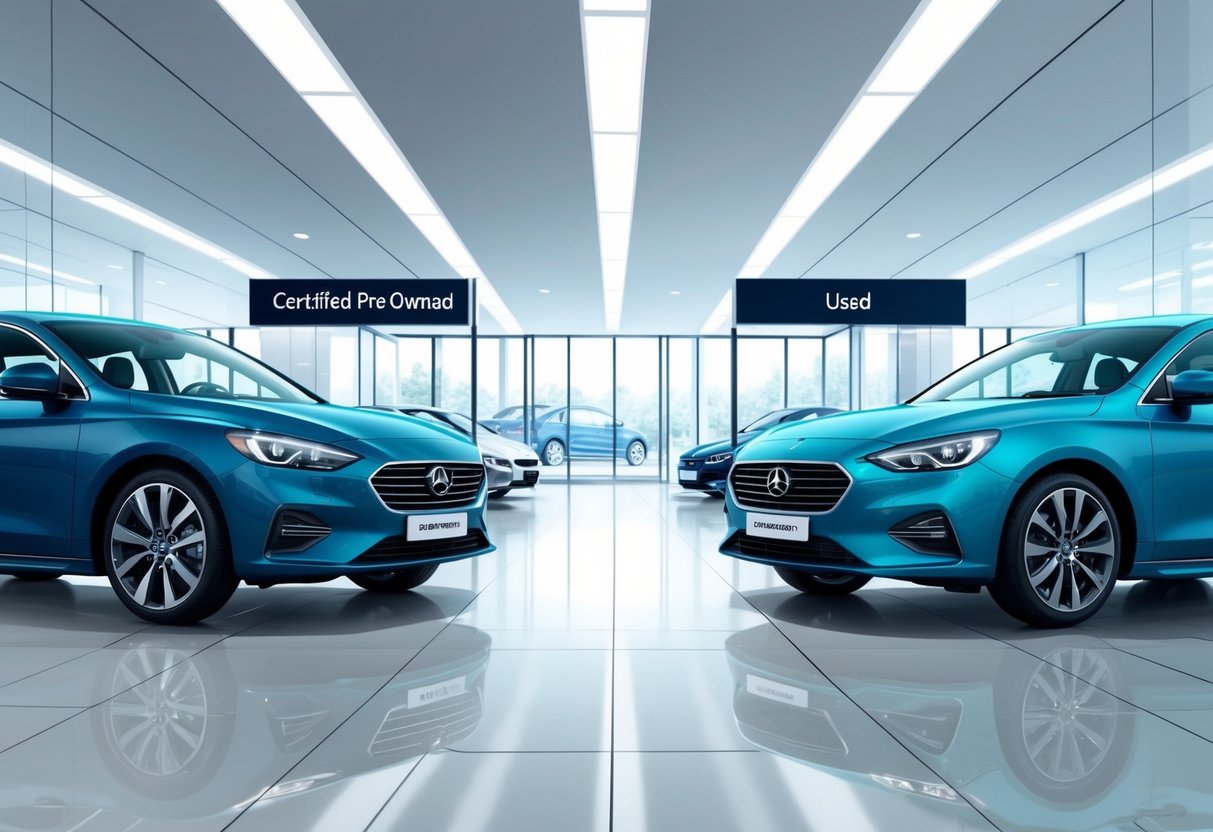
Car buyers today often weigh the advantages of certified pre-owned cars against traditional used cars when hunting for value and peace of mind.
A certified pre-owned vehicle offers vetted quality and warranty coverage, while a used car usually comes at a lower price but may require more diligence regarding its maintenance and condition.
With so many choices in the pre-owned car market, understanding the real distinctions between these two options can make a significant difference in overall satisfaction.
Many shoppers are drawn to certified pre-owned cars because they must pass rigorous inspections and usually come with extended warranties from the manufacturer.
On the other hand, used cars can help buyers save money upfront, but they often require more careful research and sometimes additional inspections to ensure long-term reliability.
Understanding Certified Pre-Owned vs Used Cars
Shoppers often face the choice between a certified pre-owned car and a standard used car.
The differences involve inspection processes, warranties, and the quality of assurances that come with the vehicle.
Definition of Certified Pre-Owned Vehicles
A certified pre-owned (CPO) vehicle is a used car that goes through a manufacturer-backed inspection and reconditioning program.
This inspection covers multiple points, such as the engine, transmission, brakes, and major systems.
Only vehicles that meet strict criteria for age and mileage are eligible.
CPO cars typically come with an extended warranty and additional benefits like roadside assistance.
These vehicles are usually late-model and have been maintained to a higher standard compared to most used cars.
Benefits may include a free vehicle history report, inspection documentation, and sometimes special financing offers.
Manufacturers intend for CPO programs to make pre-owned cars almost as reassuring as new models, although with a lower purchase price than new vehicles.
What Qualifies as a Used Car
A used car, sometimes called a pre-owned car, is any vehicle that previously had one or more owners.
There are no specific manufacturer requirements for inspection or refurbishment before a used vehicle is sold by a dealership or private party.
Used cars often do not come with warranties or may only offer a limited warranty if purchased from a dealership.
This means buyers should rely on third-party inspections and request maintenance records before purchasing.
Due to their broader availability and condition range, used vehicles can include older models and cars driven for higher mileages.
This leads to a wider price range and more options for budget-conscious shoppers.
Independent sellers, small dealers, and some larger dealerships offer used cars.
Key Differences Between Used and CPO Vehicles
The main distinction between a certified pre-owned vehicle and a used car is the level of inspection and the presence of manufacturer support.
CPO vehicles are carefully selected, inspected, and refurbished.
These cars usually come with warranty protection and additional benefits, such as roadside assistance and a detailed inspection report.
Learn more about these advantages at this CPO versus used vehicles guide.
On the other hand, used cars lack a standardized inspection process and may not include extra assurances.
Pricing for used vehicles is generally lower, but so is the level of protection and certification.
Buyers take on more responsibility for verifying the car’s quality and condition.
Key considerations include inspection rigor, warranty coverage, and service perks, which are specific to the CPO process and not usually found with traditional used cars.
Inspection and Certification Processes
Certified Pre-Owned (CPO) vehicles undergo more rigorous assessments compared to regular used cars.
Buyers should pay attention to inspection standards, the criteria for certification, and whether certification comes from the dealer or the manufacturer.
Comprehensive Inspection Standards
CPO vehicles must pass a comprehensive inspection process to qualify for certification.
This usually involves a multi-point checklist, often covering over 150 individual areas including mechanical components, safety features, and cosmetic condition.
In contrast, standard used cars do not have to follow any uniform inspection process unless arranged separately by the buyer.
Dealerships will typically replace worn components, update fluids, and address functional or safety repairs before labeling a car as CPO.
This helps ensure reliability and removes some of the uncertainty that can come with used cars.
Inspection processes for CPO vehicles often require the involvement of factory-trained technicians who follow strict guidelines.
This level of inspection aims to make the car as close to new as possible.
Certification Criteria
Certification criteria for CPO cars are set either by the manufacturer or by the dealer and typically include age and mileage limits.
Most programs restrict certification to vehicles less than five to six years old and with mileage below 60,000 to 80,000 miles.
In addition to passing the inspection, CPO cars often must have a clean vehicle history with no major accidents or title issues.
Documentation and proof of regular maintenance are sometimes required.
These standards help assure buyers that the car has been well cared for and is less likely to have hidden problems.
CPO programs may also include extras such as limited warranty extensions, roadside assistance, and free maintenance for a set time.
These benefits are tied to meeting all certification criteria, not simply passing an inspection.
Dealer vs Manufacturer Certification
CPO vehicles can be certified by either the manufacturer or an individual dealer.
Manufacturer-certified programs are generally considered more reputable because they require strict adherence to corporate inspection and reconditioning standards.
These programs offer nationwide warranty coverage and support at any franchised dealer.
Dealer-certified used cars, on the other hand, may not follow as rigorous or consistent standards.
Inspection checklists, warranty terms, and included benefits can vary widely.
While dealer-certified models may cost less upfront, their warranties and support tend to be shorter and more limited compared to manufacturer programs.
Buyers should double-check whether the vehicle’s certification is backed by the manufacturer or is unique to the dealer.
The difference impacts everything from inspection thoroughness to post-purchase support.
For peace of mind, most buyers gravitate toward manufacturer-backed CPO vehicles.